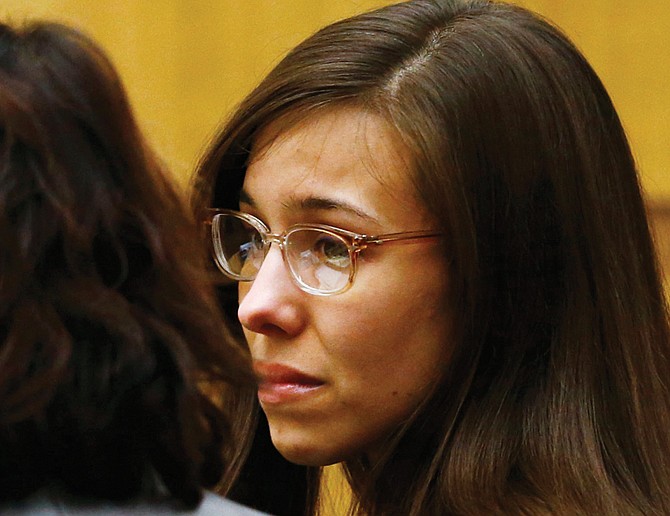PHOENIX (AP) - Jodi Arias spent 18 days on the stand sharing intimate, emotional and oftentimes X-rated details of her life before a rapt television and online audience. She had hoped it all might convince a jury that she killed her one-time boyfriend in self-defense.
But the eight men and four women on the panel didn't buy it, convicting Arias of first-degree murder after only about 15 hours of deliberations. Jurors will return to court Thursday to begin the next phase of the trial that could set the stage for Arias receiving a death sentence - a penalty she, herself, said she now desires in a stunning interview following her conviction.
Minutes after being convicted, Arias said she was overwhelmed and surprised because she didn't believe she committed first-degree murder.
"It was unexpected for me, yes, because there was no premeditation on my part," she told Fox affiliate KSAZ in the courthouse. Arias added she would "prefer to die sooner than later," rather than spending the rest of her life in prison.
The case elevated the unknown waitress and aspiring photographer to a household name, with a real-life story of love, betrayal and murder far more alluring than any made-for-TV movie. The crime itself was enough to grab headlines: Arias, a 32-year-old high school dropout, shot Travis Alexander in the forehead, stabbed him nearly 30 times and slit his throat from ear to ear, leaving the motivational speaker and businessman nearly decapitated.
She claimed he attacked her and she fought for her life. Prosecutors said she killed out of jealous rage after Alexander wanted to end their affair and planned to take a trip to Mexico with another woman.
Arias' four-month trial quickly became a media sensation - ratings gold for cable networks that could broadcast from inside the courtroom and feed an insatiable public appetite for true-crime drama delivered live and up-close. It was, for many, the horrible train wreck they just couldn't turn away from, even though they know they should.
Arias fought back tears as the verdict was announced Wednesday in the hushed, packed courtroom, while Alexander's family members wept and hugged each other. They wore blue ribbons and wristbands with the words "Justice For Travis." The family thanked prosecutor Juan Martinez and a key witness and said it appreciated the outpouring of support from the public.
Outside, a huge crowd that had gathered on the courthouse steps screamed, whistled and cheered the news in a case that has attracted fans from across the country who traveled to Phoenix to be close to the proceedings. Some chanted, "USA, USA, USA!"
When asked about Alexander's family, Arias said in her TV interview, "I just hope that now that a verdict has been rendered, that they'll be able to find peace."
Testimony in Arias' trial began in early January. The trial quickly snowballed into a made-for-the-tabloids drama, garnering daily coverage from cable news networks and spawning a virtual cottage industry for talk shows, legal experts and even Arias, who used her notoriety to sell artwork she made in jail.
The Maricopa County Sheriff's Office said no more media interviews with Arias will be granted. She has been placed on suicide watch.
The trial now moves into the so-called aggravation phase during which prosecutors will argue the killing was committed in an especially cruel, heinous and depraved manner that should allow jurors to consider the death penalty. Both sides may call witnesses and show evidence. If the panel finds the aggravating factors exist, the trial then moves into the final penalty phase during which jurors will recommend either life in prison or death.

